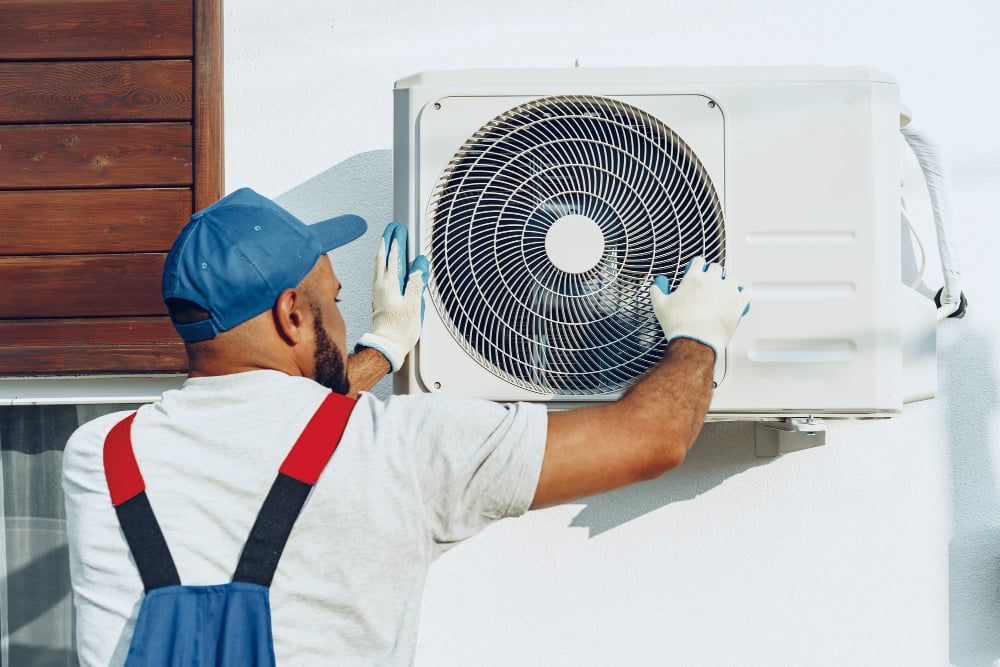Last updated on
Choosing the right HVAC (Heating, Ventilation, and Air Conditioning) system for your home is crucial for ensuring comfortable living conditions throughout the year. It’s not only about maintaining an ideal temperature but also about air quality and energy efficiency.
With a vast array of options available on the market, it’s important to carefully consider factors such as your local climate, house size, and energy consumption habits. In this guide, we’ll walk you through the essential considerations and steps to help you select an HVAC system that meets your specific needs, contributes to lower utility bills, and enhances the overall comfort of your home.
Assess Your Local Climate

The first step in selecting the right HVAC system is understanding your local climate. Take into account not only the temperature variations but also the humidity levels and any specific weather patterns unique to your area.
Areas with extreme temperature variations and high humidity levels may require systems that can handle significant heating, cooling, and dehumidification demands. On the other hand, a climate with mild winters and low humidity might not necessitate a high-capacity furnace, whereas hot and humid summers would make an efficient air conditioner with dehumidification capabilities indispensable.
It is important to choose a system that operates effectively within the temperature and humidity ranges your region experiences for the best comfort, indoor air quality, and energy efficiency.
Consider the Size and Layout of Your Home
The size and layout of your house play a pivotal role in determining the capacity and configuration of the HVAC system you need. In addition to square footage, consider the number of rooms, ceiling heights, insulation levels, and even the orientation of your home.
A system that is too small will struggle to maintain comfortable temperatures in larger spaces or multi-story homes, while one that is too large can lead to wasted energy and uneven temperature distribution. Consulting with a professional HVAC contractor who can perform a load calculation and assess your home’s layout will ensure that the system you choose is appropriately sized and configured for your specific needs.
Ensure Quality HVAC Services

Once you have a good grasp of your home’s requirements and the type of HVAC system that suits your needs, the next crucial step is to secure quality installation and maintenance services. As explained by the people behind www.betterairnw.com, choosing skilled and certified HVAC professionals can greatly impact the longevity and efficiency of your system.
Look for service providers with strong reputations, validated credentials, and a commitment to customer service. Regular maintenance by experts not only keeps your system running smoothly but also identifies potential issues before they become costly repairs. Remember, a high-quality system installed and serviced correctly can save you money and hassle over the long term.
Evaluate Energy Efficiency and Sustainability
Energy efficiency and sustainability should be top priorities when choosing an HVAC system, as they directly influence your utility bills, environmental footprint, and overall comfort. Look for systems with high SEER (Seasonal Energy Efficiency Ratio) ratings for air conditioning and high AFUE (Annual Fuel Utilization Efficiency) ratings for heating.
Efficient systems tend to have higher upfront costs but can provide significant savings in the long run through reduced energy consumption. Additionally, consider options that utilize renewable energy sources or incorporate innovative technologies like geothermal heat pumps or solar-powered systems to further enhance energy efficiency and sustainability.
Air Quality Features to Consider
Beyond temperature control, your HVAC system significantly impacts indoor air quality. Consider options with built-in air purification, humidity control, and proper ventilation features.
These characteristics are crucial for maintaining a healthy living environment, especially for households with allergies, asthma, or other respiratory concerns. Look for systems with advanced air filtration systems, humidity control capabilities, and fresh air ventilation to ensure optimal air quality and comfort.
Understanding System Types and Configurations
There are various HVAC system types and configurations available, each with its own set of advantages and applications depending on your needs and the layout of your home. Split systems, hybrid systems, ductless mini-splits, and packaged heating and air units are just a few examples.
Some systems are well-suited for tight spaces without existing ductwork, while others are designed for whole-house climate control. Understanding the differences between these systems, their installation requirements, and compatibility with your home’s layout will help you make an informed decision and choose the most suitable system for your specific needs.
Cost, Long-term Savings, and Incentives
While the initial investment is a critical consideration, it’s important to also look at long-term operational costs and potential savings. Some HVAC systems, like geothermal heat pumps, present a higher upfront cost but offer substantial savings over time due to their extraordinary efficiency and use of renewable energy.
Additionally, many local governments and utility companies offer rebates, tax incentives, and other financial incentives for installing energy-efficient systems, which can help offset the initial cost and provide long-term savings. Be sure to research and take advantage of any available incentives in your area to further enhance the cost-effectiveness and sustainability of your HVAC system.
Selecting the right HVAC system is a substantial decision that affects not only the comfort of your home but also your long-term finances and environmental footprint. By comprehensively evaluating local climate conditions, the specific needs of your home’s size and layout, the quality of the HVAC services available, and the energy efficiency and air quality features of various systems, you can make an educated choice that ensures optimal comfort and performance.
Furthermore, understanding the different system types and taking into account the total cost of ownership, including potential long-term savings and available incentives, will guide you toward a wise investment. Always remember that a thoughtfully chosen HVAC system, professionally installed and well-maintained, is the cornerstone of a comfortable, healthful, and efficient home.
Recap:



